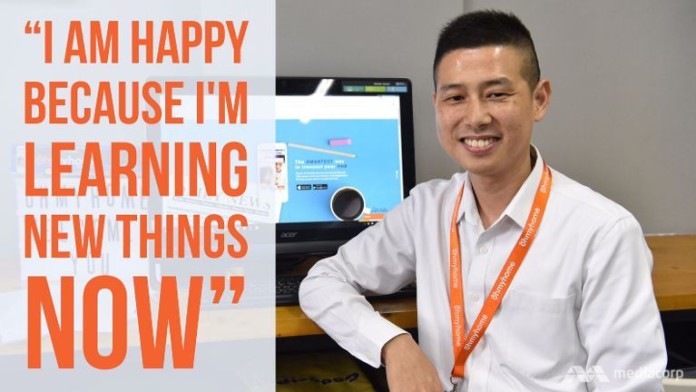SINGAPORE: It is not difficult to spot Mr David Ng in the office of online real estate platform Ohmyhome.
Amid a sea of T-shirts and jeans, his white collared shirt and black pants stand out.
While his other co-workers surround themselves with various electronic gadgets, Mr Ng’s preferred corner desk only has a pen, which he carries around in his pocket, and a few pieces of paper.
“I’m the oldest here so my way of working and dressing is very different,” the 46-year-old said with a smile. “My colleagues are all very, very young.”
At Ohmyhome, the majority of its employees are in their 20s. Even the founders of the local start-up, which connects HDB flat buyers and tenants directly with potential sellers and landlords via an app, are only in their early 30s.
In the start-up world that is perceived seems to favour the fresh-faced over the experienced, Mr Ng is a rare sight. But the soft-spoken man, who was a property agent for the past 13 years, said he had minimal hesitation when it came to making the career switch, even though his new role as an advisor offering consultation services for users of the online platform meant he had to take a monthly pay cut of nearly 40 per cent.
“There were people who asked me ‘Are you sure?’ but I told them it’s a new start and I will see what I can do,” Mr Ng, who is married with two children aged 13 and 3, told Channel NewsAsia.
Referring to the rising trend of do-it-yourself (DIY) property transactions for HDB flats as a major push factor, he added: “There are now more people who are open to not having an agent and doing the transactions themselves so that they can save on the commission. Change is already happening… so when the founders contacted me, I said ‘Ok’ because I share the same view that DIY will be the future trend.”
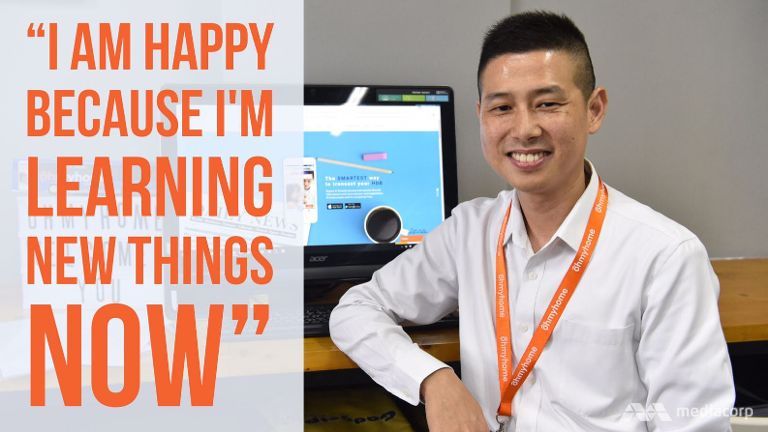
A former property agent, Mr David Ng joined online platform Ohmyhome after noticing the rising trend of DIY property transactions. (Photo: Tang See Kit)
“IF YOU ASK ME TO CHOOSE AGAIN, I WILL STILL JOIN A START-UP“
Over at homegrown fintech (financial technology) start-up Mesitis, Ms Judy Law, a customer service officer at the operations team, is also the firm’s oldest employee.
But there seems to be no apparent age gap between the 45-year old and her twenty-something colleagues who popped by the interview venue to give “Mummy Judy” moral support, as well as advice on how to pose for the camera.
“Sometimes people ask me if there’s a generation gap because the rest are in their 20s and 30s, but I don’t think so. We hang around to chat or go out for drinks after work… At work, they are fast with Microsoft Excel while I’m experienced with all the financial products, so we help each other,” Ms Law told Channel NewsAsia. “I think we get along very well.”
Apart from that, work at the start-up has been enjoyable. After spending 20 years in the banking and finance industry, Ms Law said she relishes the casual work environment, wafer-thin hierarchy and the opportunity to wear different hats at work.
“At a big company, when you’re employed to do this means you will do only this. But here, I get to try different things like organising an event such as our company’s month-end ‘chillax’ session, even though I’m not doing administration.”
“Everyone knows everyone here. We brainstorm together; we give views that will be considered by our bosses; we have the same goal and everyone works hard to make that work. That’s what I like,” she added. “If you asked me to choose again, I would still join a start-up.”
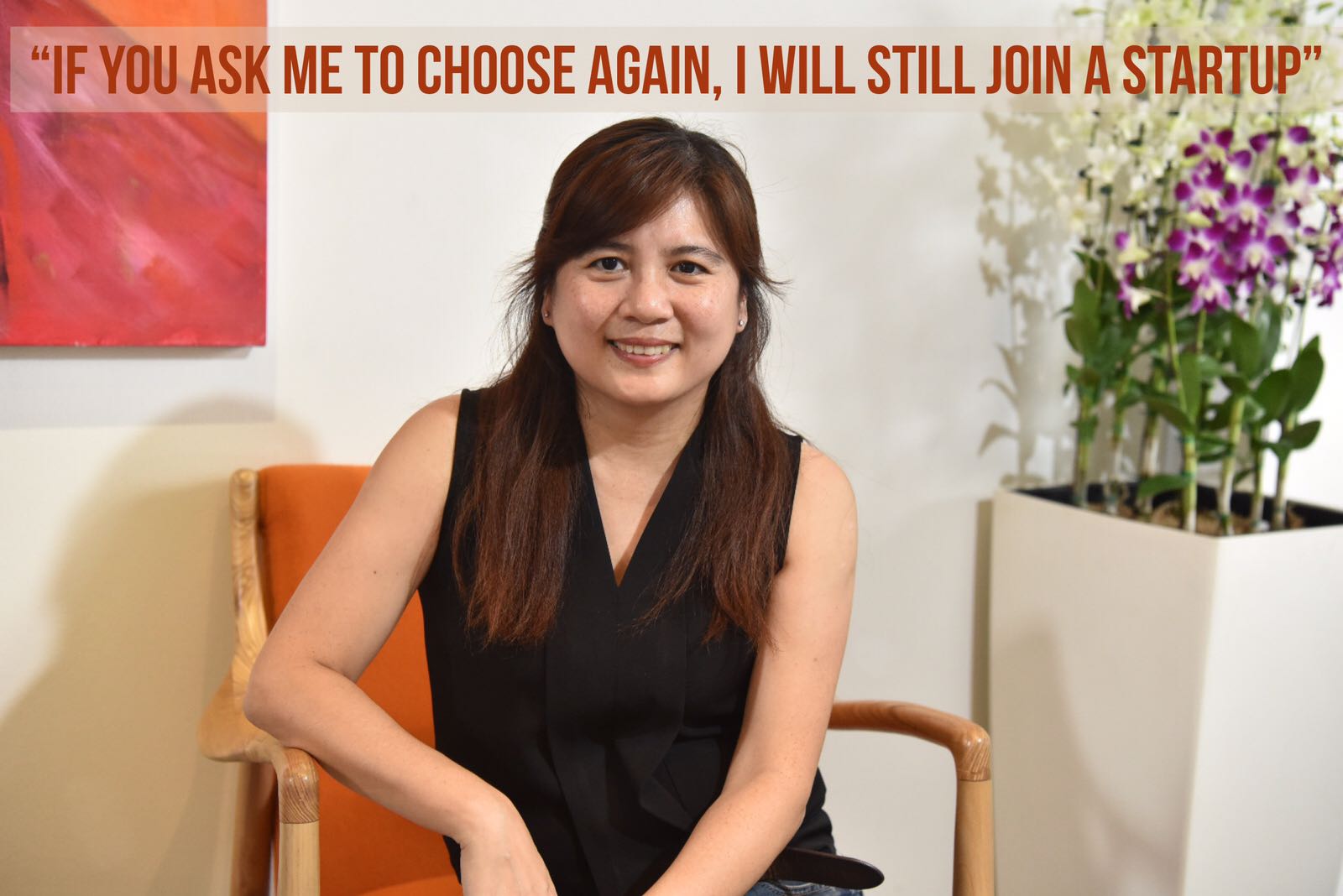
Ms Judy Law has been given the nickname “Mummy Judy” by some of her younger colleagues. (Photo: Tang See Kit)
Such career moves come at time when Singapore’s start-up scene is growing, offering more employment opportunities. According to the Department of Statistics (DOS), there were 48,100 start-ups in Singapore employing 345,000 people as of end-2015, up from 300,000 people in 37,600 start-ups in 2010. Start-ups are defined by Spring Singapore as firms with individual ownership of more than 50 per cent, at least one employee and registered within the past five years. The DOS does not have a breakdown of start-up employment across age groups.
START-UP APPEAL
The reasons why mid-career professionals are switching to working for a start-up are varied, according to those people that Channel NewsAsia spoke to.
A lean organisation structure and opportunities to pick up new skills are what attracted 45-year-old Amy Leow and 51-year-old Sue Tay to early-stage start-up Activpass. They look after corporate development, merchant acquisition as well as customer and business partnerships for the software solutions provider that is launching its cloud-based management software next February.
Describing her new role as a “do-or-die situation”, Ms Leow, an ex-marketer, joked that she has since traded in her high tea sessions for start-up events and networking meetings. “Because I am seeing merchants and investors, I need to equip myself with the knowledge and get things done.”
Her colleague, Ms Tay, said: “Everything is changing and so it’s either you jump on the bandwagon or get left out.”
“Before this, I stopped working for six months because I felt jaded but this came along and I decided this was it. My kids are all grown up so this is perhaps the best time for me to build another career,” added the Singaporean, who previously worked as a consumer feedback researcher in an Australian multinational corporation.
“START-UPS ARE NOT JUST FOR THE MILLENNIALS”
For Mr Heng Wui Liang, it is the ambition to be part of the disruptors spearheading industry change that led the former banker into the start-up world. Previously a program director overseeing digital financial services at a foreign bank, the 42-year-old now leads the Singapore operations of Indian fintech (financial technology) start-up BankBazaar.
“Banks are under a lot of pressure with the global economy slowing but they will survive. The real thing to look out for is the fintech space where a lot of innovation is happening,” he said. “That got me thinking: If I stick to whatever I have today and not change, will I be able to survive for the next 15 years? My conclusion is no and now’s a good time to learn before it’s too late.”
Founded in 2008, Chennai-headquartered BankBazaar decided on Singapore as its first overseas market earlier this year. But unlike other start-ups where the millennials run the show, BankBazaar’s Singapore team is made up of mostly middle-aged PMETs (professionals, managers, executives and technicians).
“What we are trying to do in Singapore is to build a strong base and scale up quickly,” Mr Heng explained, noting that age may just be PMETs’ biggest asset to being successful in a start-up. “We want to achieve results fast and the best way to do that is to bring in people with experience. That’s why we are fully hiring PMETs now.”
He added: “Start-ups are not just for the millennials. I think PMETs have a lot to contribute given their experiences and skillsets acquired over time.”
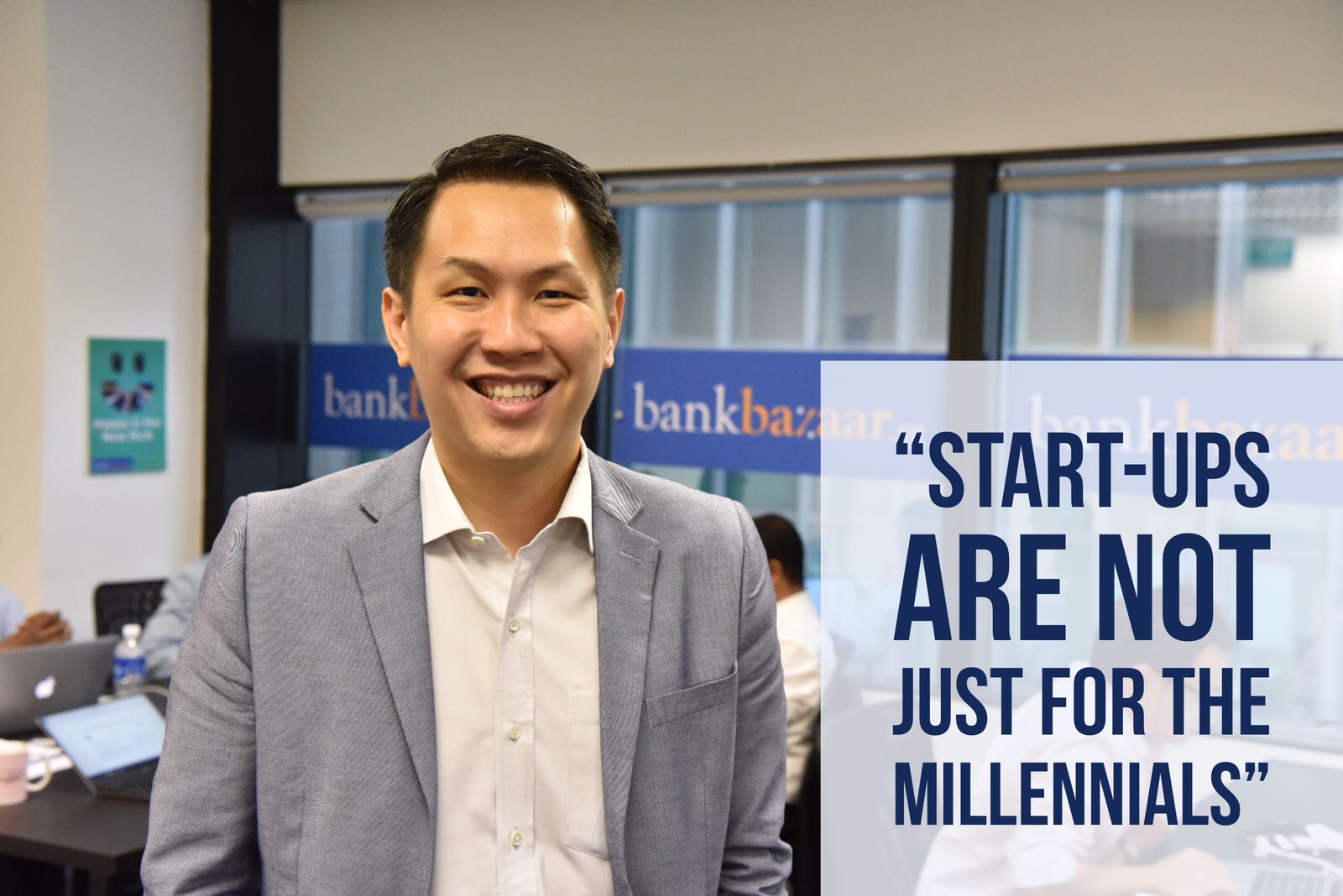
Mr Heng Wui Liang wants to hire PMETs as he believes that is the fastest way to achieve results. (photo: Tang See Kit)
However, start-ups like BankBazaar are a minority, according to industry observers and recruitment experts. Even with the rise of fintech fuelling the movement of some PMETs primarily from the finance industry into start-ups, middle-aged Singaporeans who have taken the plunge to work for a start-up remain a niche group, noted Randstad Technologies’ senior consultant De’Angello Harris.
“These are typically senior directors or managers which look to make a stepping stone to a higher level role, often C-suite, at a start-up,” Mr Harris wrote in an email response. “This change from corporate to start-up will allow these candidates to build something from scratch, often with little resistance from the leadership team, exposing them a new set of challenges and skills.”
THE HARD-FOUGHT BATTLES AND SWEET REWARDS
While these Singaporeans told Channel NewsAsia that the start-up mentality is not bound by age, the mid-career switch has not been without challenges.
Keeping up with technological developments and grasping new terminologies, for one, was a battle for some.
“When they talk about technology, half of the time it sounded like a foreign language to me. I remembered the first thing I heard when I stepped into this office was ‘This is a cloud-based system…’ and I was thinking actual clouds in the sky,” Activpass’ Ms Tay recalled with a laugh.
A non-active user of social media and smartphone apps, Mr Ng had to familiarise himself with these platforms to cope with the demands of his role at Ohmyhome. “At the beginning, I didn’t know how to make edits in the app or troubleshoot and I had to tell users that I wasn’t sure and I had to let them know again after asking my colleagues.”
For Mr Heng, it was about getting used to the tight resources that a start-up has, learning how to give up certain projects and even getting down to doing the “dirty work”.
“When I first started, we did not have a lot of resources ready and available. I bought my own laptop – that’s something you never see yourself doing at a big company. I also had to figure out the insurance policy for the start-up and employees so there’s a certain amount of nitty-gritty administrative work to do because we didn’t have the manpower,” he said. “That’s the realistic side of things.”
There were also the initial jitters about joining a newly-formed start-up but, after overcoming the hurdles, the rewards for taking the leap are clear.
“Sometimes it may be a setback because at our age, sometimes we think we know a lot… so the key is to be open and there are indeed many things I gained along the way. Apart from enjoyable work, I think I look cooler now in front of my children. I’m now a ‘hip mum’!” said the jovial Ms Tay. “They’ve been telling their friends to check out what their mum is doing.”
Sometimes, rewards may involve picking up new lingo and “getting an energy boost” from the younger generation.
“You know how youngsters speak so fast these days with their abbreviations and we just have to try to be on the same page as them and keep up,” Ms Tay said. “For example, I only realised recently that IG means Instagram.”
“Our younger colleagues have this energy around them. They are always vibrant and upbeat so I try to tap that energy from them,” Ms Leow chipped in.
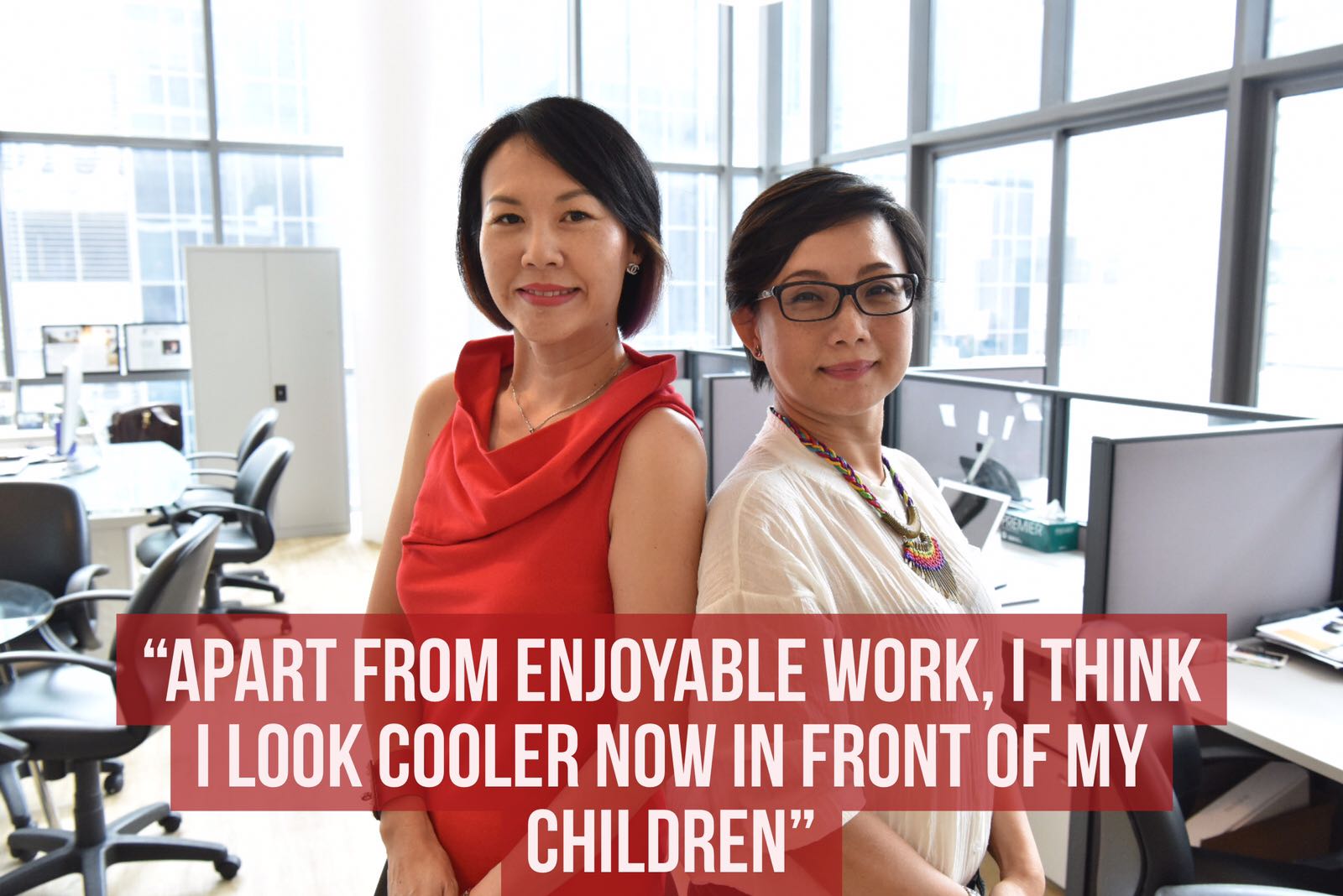
Ms Amy Leow (left) and Ms Sue Tay joined early-stage start-up Activpass to gain new skills. (Photo: Tang See Kit)
WHAT YOUNGER CO-WORKERS AND BOSSES SAY
This sentiment appears to be mutual.
Mr Gabriel Lee, 29, told Channel NewsAsia that it has been a “rewarding experience” working with his older colleagues at Activpass. While he has had to spend more time teaching Ms Leow and Ms Tay the technology side of the business, Mr Lee said he felt inspired at the same time.
“Over the past four months of working together, what I admire is their hunger to absorb and improve on a new skill that I think isn’t easy for people around their age. They could have taken it easy but chose to move out of a corporate career to a start-up that is largely unknown,” said the chief marketing officer.
“Hopefully, when I am their age, I will have the same courage to step into the unknown as well.”
Over at Ohmyhome, co-founder and chief executive Rhonda Wong said Mr Ng, who is “very diligent, punctual and honest” could be a role model for his younger employees.
“I can’t complain about my team of young ones; they are great people, extremely smart and diligent as well. The only thing with the younger crowd is that they lack punctuality because they enjoy flexibility in their work,” Ms Wong said in an email response. “If David has to attend any appointment with clients, he’s always early.”
For Mr Ng, his time at Ohmyhome has been a “happy” journey thus far. Even with the occasional speedbumps that he encounters in technology, he does not feel discouraged.
With a smile, he said softly but firmly: “I am happy because I’m learning new things now. And that’s how it should be, just keep learning and never stop.”
Follow See Kit on Twitter @SeeKitCNA
